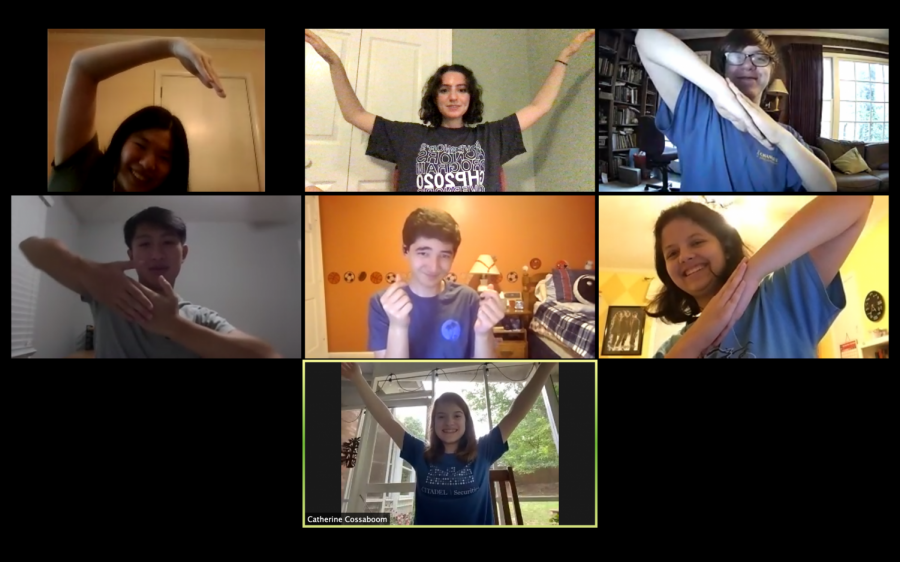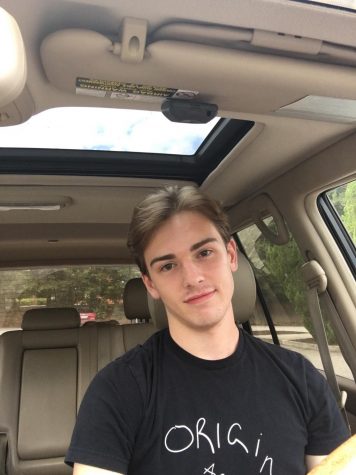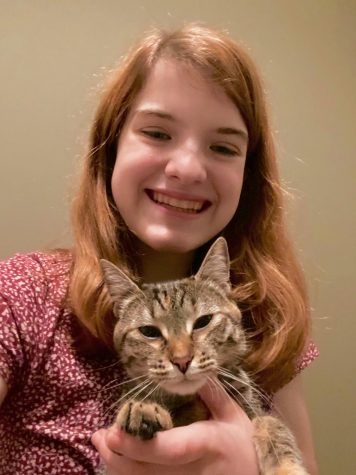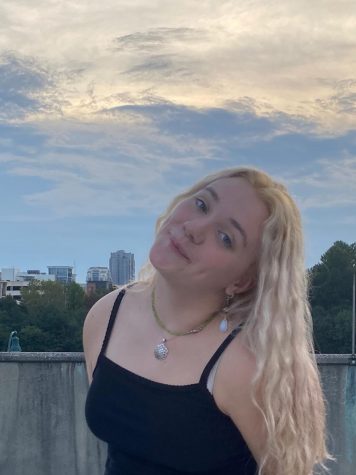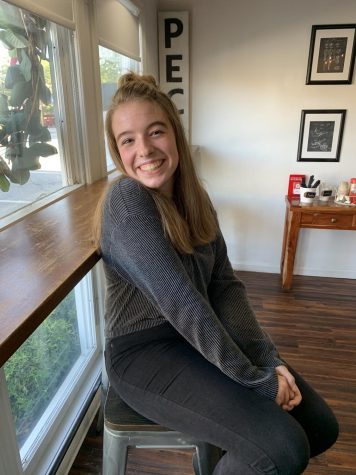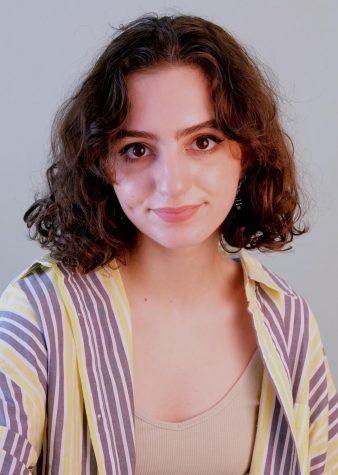2020 Visions: Controlled Chaos [March – July]
Photo courtesy of Iris Tsouris
Chamblee’s Math Team officers attempt to make a heart over Zoom for Ms. Tulchinsky, who left Chamblee over the summer.
January 20, 2021
[Editor’s note: The following article belongs to a four-part series about the year 2020. For other installments, see here.]
“I was studying for my test that I thought we were going to have when I thought we were going to go back to school,” said Esha Pamidi (‘21). “Because I was even talking to Ms. Gilliam, the day they were like, ‘Oh, we’re going to be out for two weeks. So come, pick up your instruments and art stuff.’ And Ms. Gilliam was like, ‘Oh it’s fine. Just study for your tests. I’ll see you guys in two weeks.’”
Needless to say, she did not see them for that test in late March. Or April. Or May. Schools in DeKalb County and across Georgia and the country closed as cases of Covid-19 spread. Those buildings remained closed – and classes held virtually – for the rest of the year.
Of course, the initial reactions to school being cancelled were overwhelmingly positive, as students received a break they felt was long overdue.
“I think it was two weeks before spring break,” said Jahin Zashim (‘23). “So I was like, ‘Oh, yeah, early break. We got an early start to the break.’ And then, you know, [it] ended up being a break for a long, long time.”
“It was pretty nice, honestly, spending more time with my family,” said Sophia Shi (‘24). “And also, doing things from home allowed me to take kind of a break from school, school, school because it’s different. I just complete assignments and then I’m free for the day.”
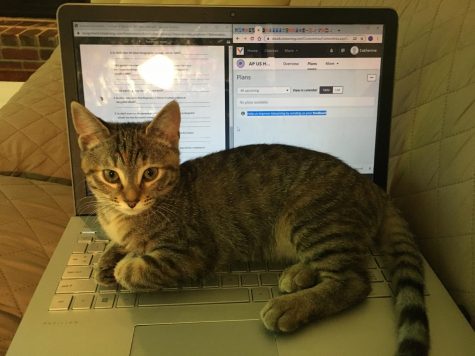
Some found the transition to virtual learning more difficult than others.
“I think, overall, [the spring semester] was a little bit of a train wreck,” said Noah Cranman (‘24). “The teachers were definitely not on the same page. I had probably 30 bookmarks in total for, like, each of my teachers. They had all these different websites that they were trying to use. It was really hard to follow.”
“School was way worse than it is now [in the fall of 2020]. The teachers didn’t really know what they were doing and I wasn’t showing up to classes because I didn’t know what to do. I didn’t know what was happening at any point,” said Katie Mogilski (‘21). “And so I definitely struggled with virtual learning, but also they weren’t assigning that much.”
“At first, it was a little overwhelming, because I would get work in classes every day that I wouldn’t normally get work in, so that was a little tough,” said Myles Allen (’22). “Being at home kind of put me at a slower pace. I was really busy the week leading up to quarantine, with school and working out a lot, and getting ready for the next football season.”
However, many saw the days off as a time to unwind, as they weren’t obligated to see anyone outside of their immediate family.
“I’m a big introvert,” said Emma Hall (‘22). “So I was happy to be staying home. I had a reason to stay home. I had a reason to sleep in. My anxiety went down a lot because I didn’t have to see anybody in public or do any classes or whatever.”
“At first, I didn’t really mind, because like I wasn’t a big fan of leaving my house anyway,” said Ariel Raggs (‘21). “Like, it kind of sucks because I didn’t get to see my school friends, but we still talked, so it was whatever. There was way less school work, so I was kind of calm.”
“It was like a break from social activities and talking to people, seeing people,” said Shi. “And that was, honestly, nice because school can be very draining socially.”
Students saw the senior class as the most tragic, as the coronavirus irreparably altered their final months in high school and, for some, their futures beyond it.
“I don’t know how I felt in the beginning,” said Ashley Michel (‘21). “I was so sad for the seniors, because some of them I would have never seen, like ever again. And I was like, wow, I never said my goodbyes to some teachers and seniors. I was kind of sad for that month.”
“It kind of made it difficult because I got into a lot of out-of-state schools that I wanted to go to but it just didn’t make sense to leave,” said Sania Hassan (‘20). “Because I would be coming back and my mom’s really susceptible to the virus and things like that. So I just decided on Georgia State [University]. And it is great and I do enjoy Georgia State and it makes sense, but I wish I could have used those opportunities, like going to another school.”
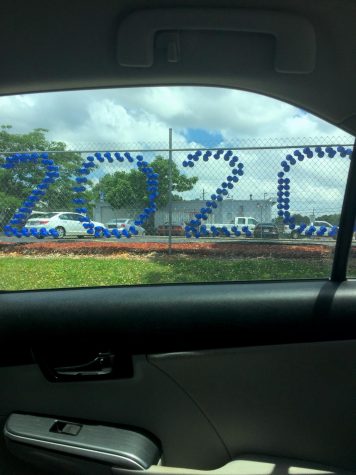
One student even had to deal with the possibility of her father being stuck in another country.
“I was very stressed,” said Deanna Sharpe (‘22). “Like, my dad was in Jamaica, so what we were doing was we would call like every other hour or so to see if there was like an open flight. Every 10 seconds, they would be canceling a different one. So that was like, it’s just a lot to handle, I guess, on top of not knowing what exactly was going to happen with school, and just like not being able to really talk.”
Later, some students would end up feeling envious of their relatives overseas.
“My family in Malaysia is handling it really well,” said Victor Lim (’21). “I guess their shopping malls are open and everything’s fine in Malaysia. Kind of wish I was there.”
Many students set personal goals to achieve using their newfound free time, but found it difficult to stay on task in the first stage of quarantine.
“The first weeks of quarantine were probably my laziest,” said Jordan Beckford (‘21). “I woke up whenever I wanted to because the school was assigning work and saying ‘Just turn it in at the last day of school and we’ll put the grade in.’ So yeah, I stayed up super late, like four AM, and woke up whenever I wanted to.”
“I think at the beginning, I kind of was like, ‘Oh my god I have so much time. I’m going to be able to do so much stuff, I’m gonna get [into] embroidery,’ and I literally ordered embroidery [supplies],” said Collette “Coco” Bradford (‘23). “And I was like, ‘I’m gonna get to watch all these shows and sleep and exercise,’ and then it kind of happened, but it just ended up with me just being really hard on myself for not doing those things.”
“I think like a lot of people, I decided I was going to be super productive,” said Olivia Mitchell (‘22). “And like, spend my time turning my life around. I spent a lot of time outside, playing baseball, just trying to get as much fun into my day, and then I slowly stopped doing that.”
But as days turned into weeks and weeks turned into months, the excitement ebbed and a feeling of intense monotony took its place. But not in a single rushing, surging wave. It was more like the tide: slow and inescapable. Students began to realize that this wasn’t just a brief time at home; this was the new normal. On March 18, Georgia reported its first deaths from the virus. A month later, the state was losing several dozen residents a day to Covid-19. People were encouraged to wear face masks and practice social distancing to protect themselves from the airborne virus.
“I think remembering back to the beginning, I started tracking the cases and I still have been doing that every single day,” said Nick Harrison (‘23). “I remember thinking, oh my goodness, if this keeps going up like this, it’s gonna be 1,000 cases a day. I remember thinking that was such a big deal, 1000 people. And now it’s just like, ‘Wait, 30,000, that’s so low.’ Definitely at some point in March, I realized this is going up and it’s not stopping. That was probably when it hit me.”
“When I started seeing advertisements, [it] was fascinating,” said Lizzie Boer (‘23). “I remember this conversation I had when we were just watching TV and then the commercials, some of them would have something to do with the Coronavirus or pandemic and I was like, ‘Oh, it’s kind of serious because like, companies are advertising and changing stuff for it.’”
“I don’t have a clear moment where I was like, ‘this is gonna be like a long time,’” said Lim. “I guess in the back of my mind, I was always hoping, right? Like during March I’m like, ‘hopefully by April it’ll settle down’ and then by April, I was pushing it back and pushing it back. And then I guess maybe when GHP [Governor’s Honors Program] was canceled, I started to realize that this is more serious than I thought.”
“I realized it was going to interrupt life when April rolled around,” said Raggs. “It was getting time for region [track tournament] and I was like, ‘We aren’t going back. I’m not going to get to run sports. This might take a while, We’re not going to get the rest of the school year.’ Then my summer camp got cancelled and I’m like, ‘Huh, not going to get summer either but I saw that coming.’ The beginning of the year rolls around and I realize this is going to take a while. We’re going to be here for a minute. I remember asking, ‘How long did the Spanish Flu last?’ I typed it in the computer. Two years, apparently, just in case you didn’t know.”
“For me, it was during spring break because I remember on April 18th, I was supposed to go see Hamilton,” said Joanna Louis-Ugbo (‘22). “And like I had all my tickets ready. And during spring break, they’re like, ‘Oh yeah, all Fox Theater shows are canceled from now on.’ I know some of my friends that were juniors last year, they’re like, ‘Oh, shoot, prom was also on that day.’ They also said that prom was going to be canceled around that time. So once they started canceling major things, I had planned for, I was like, yeah, this is not gonna stop anytime soon.”
The cancellation of prom and other events for rising seniors hit many members of the class of 2021 hard.
“I remember we were talking about how it was so sad for the seniors last year because they didn’t get their prom,” said Esther Williams (‘21). “They didn’t get their graduation, you know? Yeah. But this year is so much more different in that we don’t get, like, anything. Right now, we don’t get our senior breakfast. And I know it’s like, not that, you know, big of a deal. But it’s something that we were kind of looking forward to.”
“We didn’t have graduation and we were going into summer with just no closure whatsoever,” said Mogilski. “I was supposed to do my junior crowns [paper crowns worn to school during the last week of students’ junior year] and I thought that we were supposed to come back to school by then.”
“Well we missed out on the senior activities, you know, football games,” said Lim. “We never got our crowns which was sad, and then homecoming.”
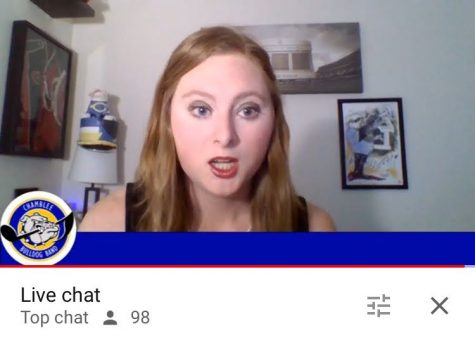
Instead, students had to settle for family game nights. But for the first few weeks, bonding with parents and siblings was a highlight of quarantine.
“I feel like the pandemic brought me and my sister closer actually, because we had to spend so much time together,” said Sharpe. “Because normally, once I come [home] from clubs after school, she’d be playing sports, [and] then the only time we really see each other was on the drive home. And then like, we’d have to go to bed because we were so tired from the day. But being at home so much, we really got to find out what we were both interested in and bond over that.”
“Yeah, my sister came back from college and I feel like as we got older, like our relationship got better because we used to just fight over the stupidest stuff,” said Wallen. “It used to be just all bull**** toxic insults, but now it’s like we’ve figured out that that was stupid.”
However, this positive quickly faded for some students.
“[It] put a lot of strain on my family, like being around my family every minute of every day,” said Luca Antinozzi (‘22). “There were a lot of blow ups, especially in April. So yeah, that was a big thing.”
“We’re all a little bit more irritable,” said Alek Dyer (‘23).
“I was like, definitely going to lose my mind. My dad doesn’t get any Gen Z jokes,” said Wallen. “It’s not even Gen Z jokes, he doesn’t get dark humor, or any, any of the humor that I like. It’s just total disconnect. The only thing that we actually relate over is skating and TikTok because he’s in love with TikTok. He made a TikTok of him making lasagna.”
“There’s only so much time you can spend with people before you start getting annoyed with them,” said Shi. “My family and I, we definitely grew closer, but there were many moments where I just could not stand my brother for one moment longer.”
“You’re stuck in the house with the same people for what – months at a time? – doing the same thing, waking up, going to school or them going to work, and it’s just the same thing over and over again,” said Wallen. “I just get tired of it, man. I’m tired of them right now but I can at least I get to go out sometimes, like on Wednesday when we don’t have school, but it’s just like, it’s just like nobody knew how bad it was going to get.”
Some households were forced to make more drastic lifestyle changes than others.
“My dad’s a chef,” said Boer. “So then he didn’t really have a job for a moment because at first they weren’t doing food or anything.”
“My family’s high risk so we can’t really go out, like we only go out to get groceries,” said Naomi Yen (’24). “And it kind of sucks because sometimes I just want to see my friends. but I know I can’t because of my family.”
“I couldn’t see my grandmother because she lives in assisted living and so I kind of went from seeing her like every couple of weeks to not at all,” said Mogilski.
“My mom was at risk of losing her job,” said Kendall Young (‘21). “And my stepdad had to switch from teaching in person to online classes.”
Multiple students’ parents are healthcare professionals, which further complicated their life in quarantine.
“My mom is a doctor. So like, that was a little harder because she actually had to go to the hospital and she’s an oncologist, so she treats patients with cancer. They’re more vulnerable, like they’re more prone to getting Corona,” said Pamidi. “And also because she’s working in a hospital environment and, you know, there’s patients going in and out and people who could be infected. So I think that was especially tough. So my mom quarantined herself in one of our bedrooms and stayed there […] initially.”
“My mom actually works at a hospital, so in the beginning we were really worried about her health,” said Shi. “We have almost this room that’s kind of separated from the house a little bit. So [she had] to come home from work through the back door, go into the room, shower, and then come out. And even then, she was really worried that if she got anything, we would get it as well.”
It wasn’t all stressful though. For some students, the extra – or excess – time at home provided the incentive to explore passions and interests that a full academic and athletic schedule do not allow. In short, there was a lot of baking going on.
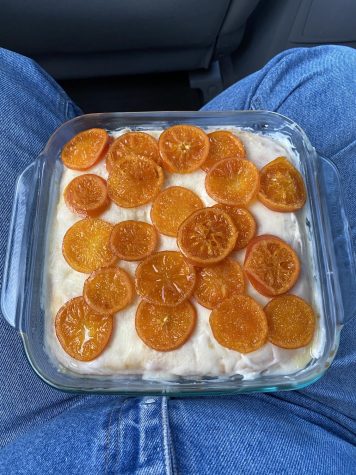
“I’ve been practicing cooking, and I’ve also been getting into some of my hobbies,” said Cranman. “Like I started a YouTube channel and I’ve been trying to write scripts and stuff to explore that passion, and I’ve looked into computer-aided design because I really enjoy drafting and design and art. I think I’ve been doing a lot of activities that helped me explore myself, and I have been enjoying it.”
“I’ve gotten into learning about music and making music,” said Fernando Aguilar (‘23). “Like GarageBand and mixing music all together. Writing lyrics is also fun and pretty time consuming, so I’ve been doing that.”
“I also got back into reading ‘cause like, usually, I don’t like reading stuff, but once I got into quarantine, I tried to find books that were interesting and my friends and I, we exchanged,” said Louis-Ugbo. “Like if we found a book that we liked, we’ll tell other people, ‘Oh, I just read this book. This was a good book.’ And it was like a mini book club.”
“During quarantine my family decided to move,” said Lim. “My dad said that now is a good time[…]. To pass the time, I also painted walls, which is really therapeutic.”
“I got a car towards the beginning of quarantine and I’ve been working on that, and my dad got another car that we’ve been working on so I’ve been learning a lot about cars,” said Mitchell. “We finished my suspensions [in November] because they were messed up. We got an old junk car for like $1,000, and we just fixed up everything that was wrong with it. So we’ve been able to drive it and like, we basically just replaced everything.”
“My big thing is I became like an intense gardener, like, intense,” said Antinozzi. “Like we bought a greenhouse for this winter. I was germinating seeds just like [an] old British lady.”
“I literally just went to Hobby Lobby last week to buy knitting needles and yarn,” said Michel. “I’ve gotten to that point and I’m gonna start. Does anyone want a sweater? Let me know.”
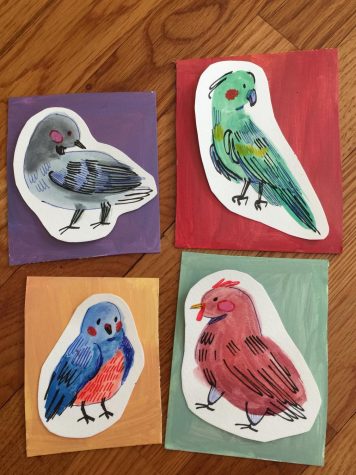
As summer approached, plans became more and more fluid. Left to their own devices, students found replacements for summer camps and vacations.
“A lot of the summer programs got canceled, which sucked,” said Antinozzi. “There’s a lot of like those extracurricular, like college credit-y type stuff that I was looking to do [that] didn’t happen, but I did get to do different stuff, like, I got to independently manage a bunch of bird boxes for research in North Atlanta.”
“I was trying to beef up my college resume this summer, so I had a bunch of internships planned and summer camps, like academic summer camps that all got canceled. So I didn’t get to do anything to, you know, help strengthen my college resume, but I did get a job,” said Louis-Ugbo. “Which was very interesting because I was going there almost every day. And it kept me busy because I literally was losing it in my house 24/7, being bored all the time.”
For others, summer was a relaxing transitional period.
“It did help to get out and go biking because I rapidly built up my endurance,” said Harrison. “Near the end of April, I was going on like, three-hour bike rides on trails to downtown. So that definitely used up a whole lot of time. That was very good. But then, after it got hot, time would just drift by.”
“There were a couple times in June, me and [my friend] Stella, we picked up skateboarding and another friend would come over, and the three of us would just skate around my neighborhood and we would do that every day for hours,” said Mogilski.
“Over the summer, I had a lot of time to just reflect on myself and I had a lot of extra time to do things that I hadn’t really thought about doing before,” said Sophia Kim (’23). “Like new activities and stuff that I wouldn’t really have time for [during] other summers from doing other [extra]-curriculars and vacations and all that.”
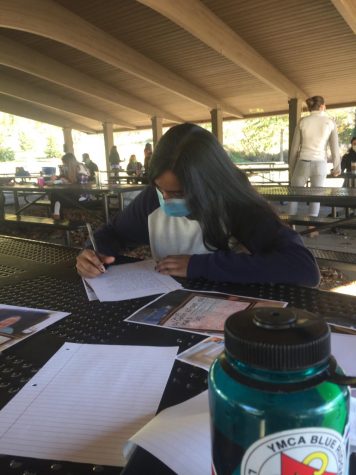
However, it was difficult not to think about what could have been.
“So in my religion like we have Ramadan because I’m Muslim,” said Zashim. “And at the end of Ramadan, we have a huge celebration called Eid. This summer, it was like we had both, like we have two different Eids. There are two different holidays and both of them fell this summer. Usually we celebrate a lot and then we have a lot of fun, we go outside, we go visit other people, like people who don’t even live near us. It was like that huge part of social celebration and just like, celebrating other people. That one was definitely very different in the quarantine.”
“It helps that the summer was like the first part of quarantine because you kind of got to ease into it because there was no school,” said Mitchell. “But all I can think about is [that] I missed Shaky Knees [Music Festival].”
“For my family, we were planning a big trip to go to Jamaica,” said Beckford. “I think we were supposed to go in June for my dad’s birthday and a couple other birthdays in my family and we never got to go.”
Many used their free time to educate themselves on social issues, particularly over the summer, after the murder of George Floyd by Minneapolis police officers catapulted the Black Lives Matter movement back into the national spotlight. Student involvement ranged from reading up on police brutality to organizing protests and working with activism organizations. One student even saw the initial nights of unrest firsthand.
“I went to one protest actually, we went downtown,” said Michel. “First we went by Lenox [Square Mall]. But literally like the National Guard were just blocking borders around Lenox, we went to Phipps Plaza, a lot of military people were there too. And then we went downtown. I don’t go to Atlanta a lot. So I don’t know the areas but it was downtown, and a bunch of people were there with signs protesting. And they cut them off. Like they had a bunch of people with shields and their military gear.”
“We did consulting,” said Raggs. “We do a lot more community work aimed towards including black people in the Jewish community now. It’s a lot of work, but it’s a good thing.”
“All of that spare time I had, there was research I did to really, show me, open my eyes to what’s really going on,” said Harrison. “Even though I didn’t take part in protests, I was educating myself.”
“Some of my friends and I actually ran an account this summer called BIPOC of Chamblee,” said Louis-Ugbo. “And we went around collecting people’s stories of basically discriminatory or racist experiences. […] When we were planning to go back to school, we were going to push the administration to make Chamblee a more safe and comfortable environment.”
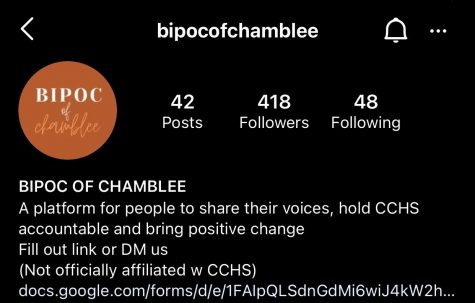
Although horrified by the actions of their peers, some in the Chamblee community were not surprised by the stories being shared, especially after old videos of CCHS students using racial slurs were brought to light in early June on social media.
“I wasn’t even shocked [by the videos], if we’re being honest. Our school’s a mess,” said Boer.
“Yeah, if you saw that, you’d be disappointed, but that’s not shocking at all for Chamblee,” added Spoorthi Satish (’24). “In middle school I would hear that every day, like white people just saying the n-word, that was normal, which is so disappointing to say, but no one would say a thing.”
However, students are optimistic about the future.
“I think that the stuff that happened this quarter or this year really pushed for change in Chamblee because a lot of that stuff has been happening for a long time, but nobody really spoke up about it,” said Louis-Ugbo. “But now that more and more people are being aware of the situation, it was easier to make it right.”
Because some parents were reluctant to let their children join crowded protests due to the pandemic, social media-based activism became popular.
“I signed petitions and filled out letters, but I didn’t really do much other than that,” said Lim. “With the whole pandemic, it was kind of hard to go out and protest.”
However, this type of activism has come under fire for being “performative.”
“Oh, I’ll do like the petitions and all that and I’ll post this stuff on my social media, but I kind of feel like it’s pointless on social media,” said Wallen. “Because I know for a fact a whole bunch of people are doing it just so they don’t get canceled[deplatformed for problematic behavior].”
“You’re like ‘Hey, check out this article, It was a cool point of view,’ [but] are they going to actually spend time on that?” wondered Bradford. “It’s not going to help to post things on social media because they’re not going to look at them. Which sucks.”
However, both Wallen and Bradford noted the positive impacts of online activism.
“I will say, a lot of people have noticed the position of privilege that they were in, and then they tried to use it to help the cause,” said Wallen. “And that was pretty nice to see.”
“[But] it’s good to spread things, even if it doesn’t really get to the people you want to get to, because it’ll get to somebody, hopefully,” said Bradford. “That’s the goal.”
The lack of schoolwork and summer camps provided ample time for the self-reflection that Bradford hoped for.
“There’s a book called How to Be an Anti-Racist [by Ibram X. Kendi]. I read that and I realized that there’s a lot of things that I was doing and just the ways that I thought,” said Toby Russell (‘23). “Not necessarily what I was doing, but the ways that I thought that could kind of relate to the movement as a whole. So I think it was a time where I got to look at myself and got to look at others and see how, you know, I might judge others, just based on different characteristics of them that I shouldn’t be doing.”
Many students’ self-reflection extended beyond examining personal prejudices.
“I got a lot happier during quarantine,” said Mogilski. “Having alone time to reflect on everything and just getting a whole new perspective on the world felt nice. I don’t have to see people I don’t like, who make me upset, so obviously, I’m going to be a happier person day to day because I only see people I want to talk to.”
“I think it definitely slowed down our life a lot,” said Cranman. “Before coronavirus, we always felt like we had to go go go, and I think this definitely put a different pace on that.”
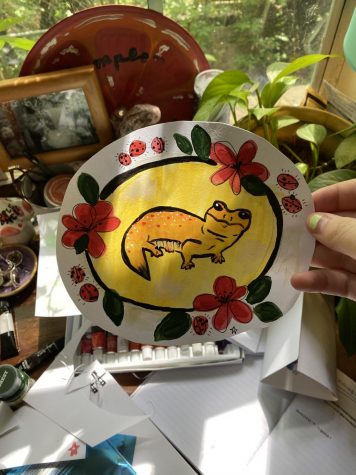
Other students agreed that quarantine has been a period of growth for them.
“Well, I think that with the pandemic and not going out, I had a lot more time to focus on myself,” said Shi. “And going back to those [New Year’s] resolutions, where I wanted to build a lot of healthier habits, it was a lot easier for me to do so during quarantine because I wasn’t going out with my friends or going to the pool or something like that. So I definitely could focus on myself more.”
“I feel like I’ve grown a lot more talkative,” said Williams. “When I talk to people now I’m very outgoing. Instead of being shy, and being like, ‘Oh, what do they think?’ I’m like ‘Look, I have lost so much social interaction. And I’m gonna catch up now.’ And I’ve just learned how much I really, really, really like talking to people.”
For others, the pandemic has halted—and perhaps even stunted—the personal growth of students across the board.
“But like, I think that a lot of people, a lot of freshmen, probably still kind of haven’t really—not that, like, we haven’t changed much over the summer—but I feel like a lot of people haven’t really experienced anything that changes them or their personality over the quarantine,” said Russell. “Like everything just kind of stopped and we’re all waiting for it to start back up again.”
Although we are largely still waiting, some things are simply inevitable, unstoppable by even the most difficult circumstances. As this bucolic period of quarantine ended, we entered a new chapter: getting back to work. Back to school.

